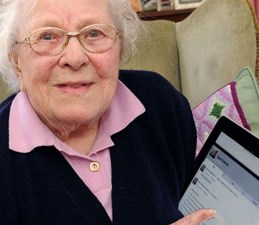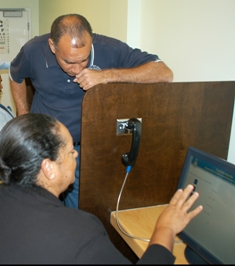 Technology
Technology

Government delegation heading to Spain
 (CNS): The deputy premier, who is the minister with responsibility for communications, will be leading a Cayman delegation to Spain for the Global System for Mobile Communications Association Mobile World Congress in Barcelona. Juliana O’Connor-Connolly and the team will be leaving the Cayman Islands Friday for the four day conference, which is an annual telecommunications industry event, bringing together mobile telecommunications providers, regulators and policy-makers, officials said.
(CNS): The deputy premier, who is the minister with responsibility for communications, will be leading a Cayman delegation to Spain for the Global System for Mobile Communications Association Mobile World Congress in Barcelona. Juliana O’Connor-Connolly and the team will be leaving the Cayman Islands Friday for the four day conference, which is an annual telecommunications industry event, bringing together mobile telecommunications providers, regulators and policy-makers, officials said.
According to the website it is the “best venue for mobile industry networking, finding business opportunities, and making deals,” where “more than 1,300 companies displaying the cutting-edge products and technology that will define the mobile future.” It also says that the 49,000 people from the 192 countries that attended last year were predominantly from the commercial sector.
The minister will be accompanied by her Executive Aid Paul Leonce, Chief Officer Kearney Gomez, Director of the Information and Communications Technology Authority (ICTA) David Archbold and MLA Cline Glidden. With the premier still in the UK, Rolston Anglin is currently acting premier, so Community Affairs Minister Mike Adam will act as the deputy premier. Officials said O’Connor- Connolly will return to the Cayman Islands on Thursday, 17 February.

Church gives blessing to iPhone confessions
 (BBC): The Catholic Church has approved an iPhone app that helps guide worshippers through confession. The program – called Confession – went on sale last week through iTunes for $1.99. Described as "the perfect aid for every penitent", it offers users tips and guidelines to help them with the sacrament. Now senior church officials in America have given it their seal of approval, in what is thought to be a first. The app takes users through the sacrament – in which Catholics admit their wrongdoings – and allows them to keep track of their sins. It also allows them to examine their conscience based on personalised factors such as age, sex and marital status – but it is not intended to replace traditional confession entirely.
(BBC): The Catholic Church has approved an iPhone app that helps guide worshippers through confession. The program – called Confession – went on sale last week through iTunes for $1.99. Described as "the perfect aid for every penitent", it offers users tips and guidelines to help them with the sacrament. Now senior church officials in America have given it their seal of approval, in what is thought to be a first. The app takes users through the sacrament – in which Catholics admit their wrongdoings – and allows them to keep track of their sins. It also allows them to examine their conscience based on personalised factors such as age, sex and marital status – but it is not intended to replace traditional confession entirely.

Amazon Kindle e-book downloads outsell paperbacks
 (BBC): Amazon has announced that in the US it sold more e-books for its Kindle device than it sold paperback books in the last three months of 2010. But its profit margins were down as it spent money on discounting, acquisitions and building new depots. Amazon shares fell 9% in after-hours trading as its sales were not as good as had been expected. Three month net sales passed $10bn for the first time, up 36% to $12.95bn, but analysts had predicted a higher figure. Three month net income came in at $416m (£262m), which was up 8% from the same period last year. The world’s biggest online retailer’s operating margin declined to 3.7% from 5% at the end of 2009 and the company warned that it would be between 2.8% and 3.8% in the first three months of 2011.
(BBC): Amazon has announced that in the US it sold more e-books for its Kindle device than it sold paperback books in the last three months of 2010. But its profit margins were down as it spent money on discounting, acquisitions and building new depots. Amazon shares fell 9% in after-hours trading as its sales were not as good as had been expected. Three month net sales passed $10bn for the first time, up 36% to $12.95bn, but analysts had predicted a higher figure. Three month net income came in at $416m (£262m), which was up 8% from the same period last year. The world’s biggest online retailer’s operating margin declined to 3.7% from 5% at the end of 2009 and the company warned that it would be between 2.8% and 3.8% in the first three months of 2011.

UK Granma is world’s oldest face book user
 (Orange News): A 103-year-old grandmother is believed to be the world’s oldest Facebook user. Lillian Lowe, from Tenby in Pembrokeshire, regularly keeps her online friends updated about her life using her iPad. And being signed up to the social network also enables her to keep track of what her seven grandchildren and 13 great-grandchildren are up to. Lowe, who is just two months away from her 104th birthday, took the oldest Facebook user title following the deathof 104-year-old Ivy Bean in July.Despite some of the Facebook goings on that would shock many her age, Lillian says she isn’t fazed by any of her grandchildren’s "antics".
(Orange News): A 103-year-old grandmother is believed to be the world’s oldest Facebook user. Lillian Lowe, from Tenby in Pembrokeshire, regularly keeps her online friends updated about her life using her iPad. And being signed up to the social network also enables her to keep track of what her seven grandchildren and 13 great-grandchildren are up to. Lowe, who is just two months away from her 104th birthday, took the oldest Facebook user title following the deathof 104-year-old Ivy Bean in July.Despite some of the Facebook goings on that would shock many her age, Lillian says she isn’t fazed by any of her grandchildren’s "antics".

FCC is set to regulate net access
(The New York Times): The Federal Communications Commission appears poised to pass a controversial set of rules that broadly create two classes of Internet access, one for fixed-line providers and the other for the wireless Net. The proposed rules of the online road would prevent fixed-line broadband providers like Comcast and Qwest from blocking access to sites and applications. The rules, however, would allow wireless companies more latitude in putting limits on access to services and applications. Before a vote set for Tuesday, two Democratic commissioners said Monday that they would back the rules proposed by the F.C.C. chairman, Julius Genachowski, which try to satisfy both sides in the protracted debate over so-called network neutrality. But analysts said the debate would soon resume in the courts, as challenges to the rules are expected in the months to come.

ipad drives computer Chritmas sales
(CNS): Computer hardware has accounted for $27.46 billion in online shopping sales during the first 47 days of the 2010 holiday shopping season, according to a report released by comscore. The report says the iPad is the driving force behind this year’s 25 percent increase in online computer hardware sales compared to the same period in 2009. “Computer Hardware ranks as the top growing category for the holiday season to date with a 25-percent increase versus last year,” the report said. “Purchases of handheld devices (such as Apple iPads and e-readers) and laptop computers drove much of the growth.”

Government sets out future plans for e-business
 (CNS): More than two decades after the worldwide web took off as a place to do business, increase efficiency and share information, the Cayman Islands Government has established an advisory board to lay the framework for a an e-government initiative. At present very few government services can be accessed on line but government hopes to come up with a strategic plan for the next decade to realize Information communications technology as a toolfor economic and social development. According to a release from GIS, the board will review government services and recommend which of them can be offered electronically as well as promote the overall concept of e-business in the private sector.
(CNS): More than two decades after the worldwide web took off as a place to do business, increase efficiency and share information, the Cayman Islands Government has established an advisory board to lay the framework for a an e-government initiative. At present very few government services can be accessed on line but government hopes to come up with a strategic plan for the next decade to realize Information communications technology as a toolfor economic and social development. According to a release from GIS, the board will review government services and recommend which of them can be offered electronically as well as promote the overall concept of e-business in the private sector.
Last week a seminar brought together representatives from public agencies such as Computer Services, the Department of Education Services and the Information Commissioner’s Office, along with some private sector representatives to discuss the plan. The E-Government Advisory Board is chaired by George Town MLA Ellio Solomon.
Commonwealth Secretariat ICT Adviser Tony Ming, a key player in the Commonwealth Internet Governance Forum, told the Cayman officials, “On a global scale, the priority is implementing national information communication technology strategies and e-government.”
Ming said that in a 2006 World Bank ICT survey of 40 countries almost all listed e-government as the major priority. Other top-ranking areas were e-education, e-business and e-health.
He noted that this critical public sector development would serve to build capacity and promote the effectiveness and efficiency of public institutions, while strengthening the capacity of areas critical to good governance and sustainable development.
ICT also ties in to the Commonwealth Secretariat’s Millennium Development Goals 2015, which include the reduction of extreme poverty, universal education, improved environmental sustainability and building global partnerships.
In Cayman the goals are to establish a platform for the development of ICT and update legislation, to manage ICT through a statutory authority, to deliver state-of-the-art telecommunications at competitive prices and improve computer literacy amongst the population, to list a few.
Government also said it wants to encourage the use of on-line technology for businesses in the private sector and to encourage economic diversification by promoting the local and international growth of e-business.
However, one of the main stumbling blocks to the expansion of online trade in Cayman is the banks reluctance to offer accounts that enable people to shop on-line. Despite promises from the other retail banks, so far Butterfield remains the only one offering the merchant account with internet payment facilities.
Officials also hope the public sector can use IT to improve customer service and efficiency and allow easier public access to information, while at the same time protecting personal information and electronic data.

Cayman driving exam goes high tech
 (CNS): The Cayman Islands driving written test has moved into the 21ist Century with the introduction of modern touch-screen technology. Aspiring drivers sitting the written portion of the Department of Vehicle and Drivers’ Licensing (DVDL) examinations are now using the new screens which officials say will allow the department to increase the number of tests it conducts. DVDL Director David Dixon said the new technology was introduced to improve the efficiency, accuracy and security of the driving test’s written portion.
(CNS): The Cayman Islands driving written test has moved into the 21ist Century with the introduction of modern touch-screen technology. Aspiring drivers sitting the written portion of the Department of Vehicle and Drivers’ Licensing (DVDL) examinations are now using the new screens which officials say will allow the department to increase the number of tests it conducts. DVDL Director David Dixon said the new technology was introduced to improve the efficiency, accuracy and security of the driving test’s written portion.
“It also means that we will be able to conduct written tests daily, rather than the customary weekly sittings,” he said. “We currently hold some 34 written tests weekly, but the expectation with the new system is that we’ll be able to increase that number to around 200.”
Deputy Director Richard Simms said that the touch-screen technology was acquired from US-based L1 Solutions. He added that the questions and symbols in the test are based on the CI Official Road Codes, the Traffic Law (2003 Revision) and associated Regulations.
“With this test, there is no need for pen and paper; the computer creates the test, corrects it and provides immediate results. This system will also allow multiple persons to simultaneously tackle different test questions,” Simms explained.
Adding that the new technology eliminates the human element while promoting greater accuracy and fairness, Simms identified another advantage: examiners can now focus on the driving test’s practical elements. “The old system meant that the same examiners administered both the written and practical aspects. This new technology permits them to concentrate on the road test, including parking and other practical angles,” he said.
The Minister with responsibility for the DVDL, Juliana O’Connor-Connolly said the touch-screen technology represented an important investment that was critical to improving the operations of the department and its service to the motoring public. She urged DVDL officers to ensure that aspiring motorists were fully informed on how to prepare for the test and how to use the touch screen computers.

FTC backs plan to honour privacy of online users
 (New York Times): Signaling a sea change in the debate over Internet privacy, the government’s top consumer protection agency on Wednesday advocated a plan that would let consumers choose whether they want their Internet browsing and buying habits monitored. Saying that online companies have failed to protect the privacy of Internet users, the Federal Trade Commission recommended a broad framework for commercial use of Web consumer data, including a simple and universal “do not track” mechanism that would essentially give consumers the type of control they gained over marketers with the national “do not call” registry.
(New York Times): Signaling a sea change in the debate over Internet privacy, the government’s top consumer protection agency on Wednesday advocated a plan that would let consumers choose whether they want their Internet browsing and buying habits monitored. Saying that online companies have failed to protect the privacy of Internet users, the Federal Trade Commission recommended a broad framework for commercial use of Web consumer data, including a simple and universal “do not track” mechanism that would essentially give consumers the type of control they gained over marketers with the national “do not call” registry.

Scientists say early universe was primordial ‘soup’
 (TG Daily): The ALICE detector team at CERN has discovered that the very early universe consisted of a hot, dense liquid, rather than a gas. By colliding lead nuclei together at the Large Hadron Collider, the ALICE experiment generated sub-atomic fireballs with a temperature of over ten trillion degrees, mimicking conditions during the first moments of the existence of the universe. At these temperatures, normal matter is expected to melt into a primordial ‘soup’ known as quark-gluon plasma. Althoughprevious research indicated that the fireballs behaved like a liquid, many expected the quark-gluon plasma to act like a gas at these much higher energies.
(TG Daily): The ALICE detector team at CERN has discovered that the very early universe consisted of a hot, dense liquid, rather than a gas. By colliding lead nuclei together at the Large Hadron Collider, the ALICE experiment generated sub-atomic fireballs with a temperature of over ten trillion degrees, mimicking conditions during the first moments of the existence of the universe. At these temperatures, normal matter is expected to melt into a primordial ‘soup’ known as quark-gluon plasma. Althoughprevious research indicated that the fireballs behaved like a liquid, many expected the quark-gluon plasma to act like a gas at these much higher energies.
"Although it is very early days, we are already learning more about the early universe," says Dr David Evans, of the University of Birmingham and UK lead investigator for ALICE. "These firstresults would seem to suggest that the universe would have behaved like a super-hot liquid immediately after the Big Bang."